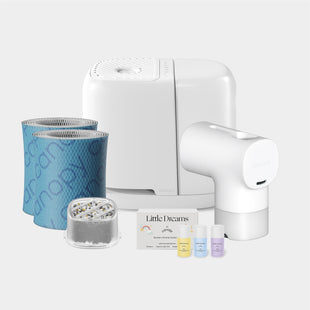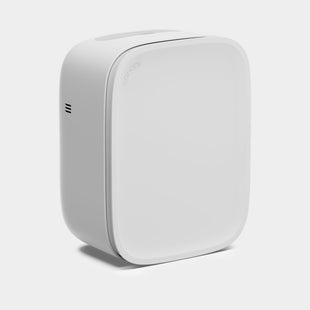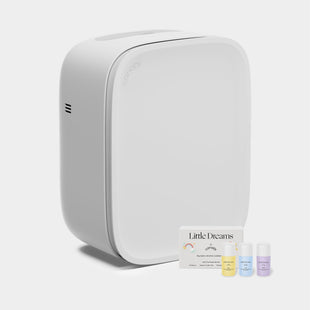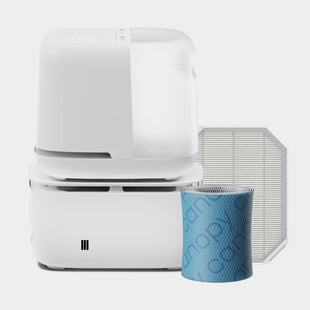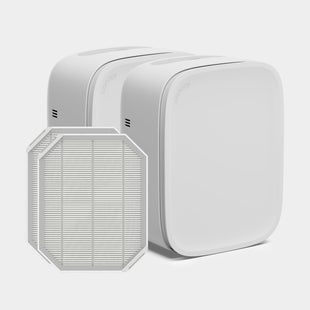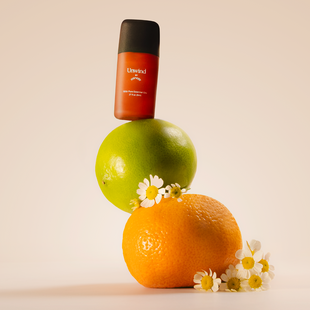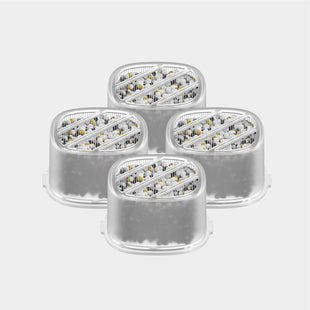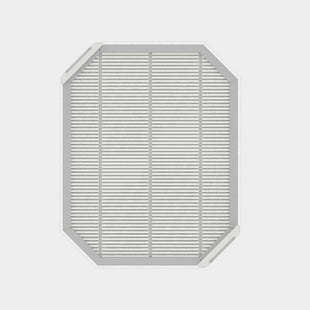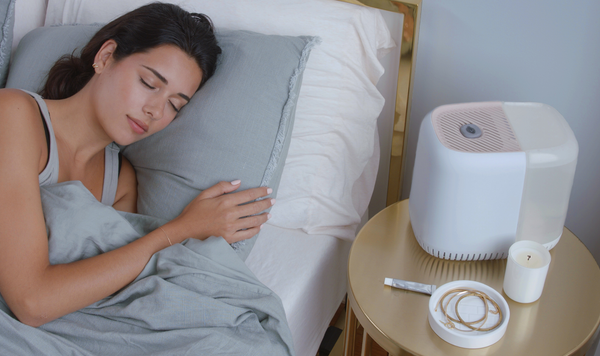This content has been reviewed and updated on March 28, 2023.
Getting plenty of sleep every night is one of the best things you can do for your health because it reduces your risk of certain chronic illnesses, improves your mood and appearance, and even helps you maintain a healthy weight. Although many people spend eight hours or more in bed every night, they aren’t always getting quality sleep—and that means they aren't getting the full benefits from their nightly rest.
While many factors influence your overall sleep quality, it’s easy to overlook how much humidity impacts your sleep quality and duration. Ideally, your home humidity level should be between 40% and 60%. When humidity levels drop below 40%, getting the recommended amount of sleep can be challenging. Dry air can cause dry or itchy skin, trigger allergy or asthma symptoms, itchy eyes, scratchy or dry throat, congestion, and more, all of which can make it difficult to get a good night’s sleep.
Placing a humidifier in your bedroom can keep the humidity at the optimal level for sleep, eliminating the effects of dry air and ensuring you get restful, restorative sleep to support overall good health.
What Are the Benefits of Sleeping with a Humidifier?
Using a high-quality humidifier to add clean moisture to the air can improve your health and wellness by reducing the symptoms of common sleep disorders, like apnea and snoring. It also eliminates discomforts like nasal congestion and throat irritation and helps relieve the symptoms of the common cold. There’s also evidence showing that adequate indoor humidity can help reduce the survival rate of airborne viruses.
How a Humidifier Helps Reduce Snoring
Nearly half of adults experience occasional snoring, ranging in severity from light vibrations to loud, disruptive sounds. Those sounds can keep the person snoring and their sleeping partner awake, preventing restful sleep for everyone.
While you sleep, the muscles in your face and throat relax, restricting airflow. When the air gets trapped in the passages, it creates vibrations—the snoring sound. Snoring can worsen when the airways dry out because the dry tissue intensifies the vibrations. Dry air also increases mucus production, making snoring louder and more disruptive.
Using a humidifier for sleep helps reduce dryness and inflammation in the throat and nasal passage and soothes irritated airways, which can help lessen snoring. Adding moisture to the air may not eliminate snoring, but it can significantly reduce the noise and associated discomforts.
Benefits of a Humidifier for Sleep Apnea
Sleep apnea is a potentially serious medical condition in which you repeatedly stop and start breathing throughout the night. Not only does it disrupt your sleep, but apnea is also associated with additional health issues, including an increased risk of cardiovascular disease and diabetes.
A continuous positive airway pressure machine (CPAP) is the most common treatment for sleep apnea. CPAP machines draw in air from the environment and deliver it directly into the nasal passages (and the mouth, if you use a full-face mask).
However, according to the American Sleep Apnea Association, if your home humidity levels are below 40%, you’re more likely to have discomfort when you use the CPAP machine. Without adequate moisture, using the CPAP machine can cause dry mouth, nasal congestion, and a burning sensation in your nasal passages.
Among the benefits of a humidifier in the bedroom is the reduction of these symptoms. When you increase the relative humidity (RH) in your home, you can improve the moisture content of the air delivered through your CPAP machine, ensuring a more comfortable and restful experience.
Skin Benefits of Sleeping With a Humidifier
The benefits of sleeping with a humidifier extend beyond better internal health and the refreshed feeling that comes from a good night’s rest. Adequate moisture in the air can also help improve your appearance by keeping your skin hydrated.

Excessively dry air can leave your skin and scalp feeling dry, itchy, or flaky and cause severely dry and cracked lips. Adding moisture can help restore the skin’s lipid barrier and reduce the signs of aging, including fine lines, crow’s feet, and wrinkles. No dark circles or bags under your eyes that make you look tired and worn out—just healthy, glowing skin.
Possible Risks of Sleeping With a Humidifier
Is it good to sleep with a humidifier? Overall, yes. However, that doesn’t mean that using a humidifier is without risk. Thankfully, those risks are minimal and preventable, so the benefits of sleeping with a humidifier outweigh them.
White Dust
Using tap or unfiltered water in a humidifier can cause “white dust,” a build-up of microscopic minerals left behind on surfaces. This is why most humidifiers require distilled or filtered water.
Canopy humidifiers have two layers of protection against mineral and bacteria accumulation in the water tank. UV lights embedded in the device kill 99.9% of bacteria in the water, while the wood pulp paper filter kills any remaining bacteria. This means you can use tap, distilled, or filtered water in your Canopy device.
Excess Humidity
Running your humidifier every night can provide exceptional benefits while you sleep. However, it’s critical to monitor the humidity in your home to ensure it remains within the optimal range. Allowing the humidity to exceed 60% can cause physical discomfort and increase the risk of mold or bacteria on the walls, curtains, or other surfaces around the humidifier.
You can measure the humidity levels of your home and enjoy the benefits of a humidifier while sleeping by using a hygrometer. If this device reads 50% or higher, avoid using your humidifier and consider using a dehumidifier to reduce moisture in the air.
Get the Most Benefits of a Humidifier While Sleeping
Proper placement and use are key to getting the most benefits of a humidifier in the bedroom. Humidifiers that produce mist should be no closer than 3 feet from your bed to prevent the moisture from dampening your bedding.
Thanks to their mist-free technology, Canopy humidifiers are designed to be placed in any room without the risk of water damage, even as close as your bedside table. The unit’s fan generates a gentle white noise when on the high setting to help you relax and fall asleep.
During the summer months, sleeping with a humidifier can offset the drying effects of an air conditioner. And during the dry, cold winter months, the device can keep your sinuses hydrated and clear to promote more restful and restorative sleep.









